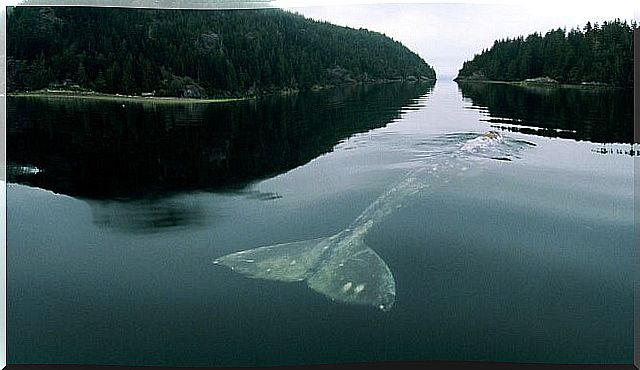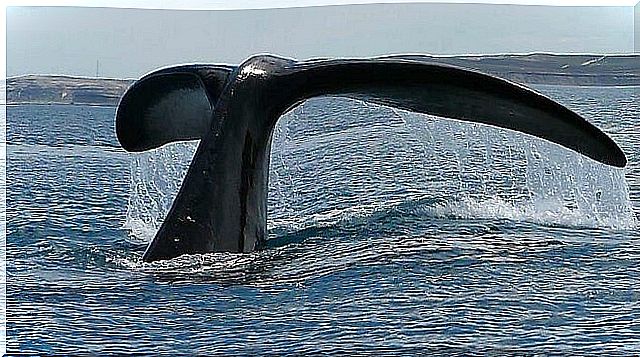The Story Of The Saddest Whale

The saddest whale on the planet has no name, although scientists and biologists know it more as “the 52 Hertz whale.” Why? Because this is the frequency that he uses to sing. And that is possibly the characteristic by which it always remains in restricted solitude since it was discovered.
The rest of the whales, such as the blue ones for example, use a song that falls within the frequencies ranging from 15 to 25 Hz. But never 52. It is something strange and unique within the world of the sea … only her Only this beautiful ocean creature is capable of raising her sad melodies of love for the aquatic world without ever hearing an answer to her calls. To his words.
Today, we invite you to meet the saddest whale in the world …
The whale that sings at a frequency of 52 Hz
As you already know, whales are incredibly beautiful creatures that have one very clear characteristic: they are social animals that have a unique and special language. It is more than usual that they raise their songs in the vast immensity of the ocean to find a partner, to stay connected and join in those large groups that we are sometimes lucky enough to observe.
Humans have always been intrigued by their songs. They relax us, fascinate us and awaken us an immense desire to know what they say, what they express. In fact, it was in 1989 when the United States Navy began to analyze their singing frequencies, trying to find out how they articulate their language and what purpose they have.
Have we accomplished anything since then? Very little, the truth, is still a beautiful enigma to unravel day by day. But one thing is clear, that language unites families. It helps them to find a mate and to keep their young close as well as to orient themselves in the sea. And many even “mourn” their dead.
When did it all start?
The case of this lone whale appeared in the late 1980s. It was Dr. William Watkins of the Woods Hole Oceanographic Institution who found the record of the song of one whale that was very different from the others . Too loud, extremely loud to tell the truth, nothing more and nothing less than 52 Hz.
So much was the interest aroused by the scientific community that they set out to monitor the animal for several years. In fact, the findings of Dr. Watkins’ team were published in 2004, hoping that they would hardly have an impact among the general public. It was only the case of a whale that always swam alone. A whale that spent much of its time singing on its “too high vocal scale”, never finding an answer.
But without really knowing how, that report aroused great interest, and immediately, the legend of the “lonely whale” emerged.

Destined to a life of solitude, for having a different language
The whale “52 hz” is different, no one can deny it. In fact, biologists cannot specify what its species is either, perhaps it is a hybrid or a unique race whose origin is not known . He speaks a language that no one understands and he swims through the oceans without finding a group to join, or a mate with whom to procreate. A sad, very sad story that immediately connected with the public.
Scientists usually follow it regularly, also discovering that this animal has a migration route different from that of any other known whale. Why does he do this? Why does he also have such a different communication capacity and why does he travel on routes that other whales do not know?
Some scientists tell us that it is perhaps much more than the saddest whale in the world. It is even possible that this precious animal is the last survivor of an unidentified species. A being that roams the oceans raising a song out of tune and following the path that his species traveled in the past. And of which, there is no one but her. Our lonely whale.
A curious reflection
Marine biologist Mary Ann Daher of the Woods Hole Oceanographic Institution in Massachusetts is the co-author of the original research on the discovery of this whale. It is she herself who tells us the following:
It seems that the story of the lone whale represents a curious reflection of the situation that many people go through. Indifference, incomprehension, loneliness, apathy … How many people have been able to feel identified with this story? How many of us speak and seem not to be understood? This is certainly a fact that many of us can quickly empathize with.
However, there is a key difference. The whale seems to belong to a different species, we, on the other hand, are part of the same species: human. So, if we feel identified with this story, perhaps we should rethink whether the steps we are taking are the correct ones. Because on many occasions, we ourselves are the ones who distance ourselves from others, believing that they are the ones who do not understand us.
Something that, without a doubt, should make us think.









